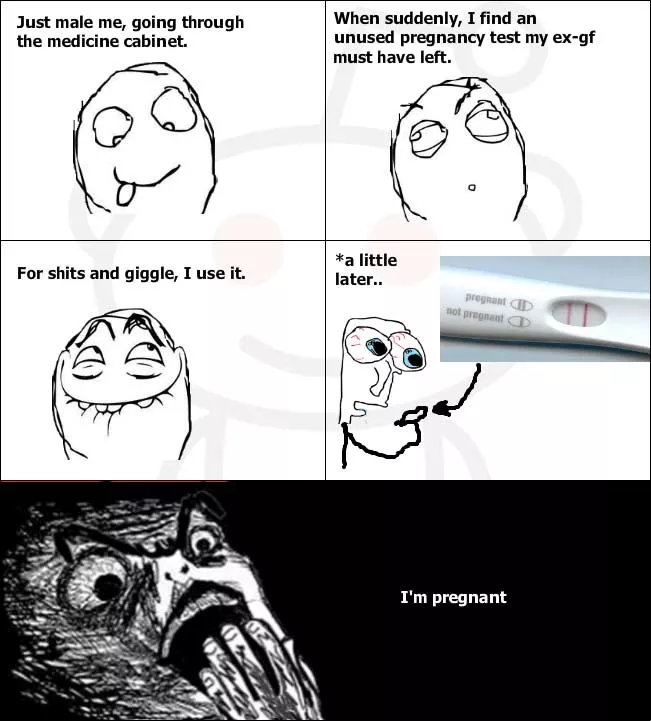What You Need To Know

Pregnancy Tests For Men
I’m sure like everyone who’s on the internet these days has, at one point or another, seen the article floating about. “Pregnancy tests for men as a joke” or something like that. This was a Reddit article that began making its rounds in 2012 if I remember correctly?
The point of the article was that after taking a pregnancy test and the results being positive, this bloke went to his Dr to find out he had testicular cancer! I remember talking about it with a professor of mine from Uni when the article came out, surprisingly he had experimented with this theory himself. This particular professor had just found out he had Germ Cell Tumors, so already knowing he had cancer, he was curious if the test results would also indicate pregnancy. After peeing on a test stick, he also had positive results.
I saw the article floating around one of my social media platforms last night and got to thinking what others might be thinking of this article? If it worked for this guy, why not for everyone? This story seems very straight forward, but giving it a deeper look, a vast number of variables come into play with what cancers can be found through these pregnancy tests.
What Causes This Positive Result On Pregnancy Tests For Men?
First, you have to identify what chemical marker the pregnancy test is looking for. The answer Beta Human Chronic Gonadotrophin or HCG for short. HCG is a hormone that is rarely present in the body man or woman. HCG makes its appearance as rapidly growing cells begin to attach themselves somewhere they weren’t before. (Generally when an Embryo attaches itself to a uterus.)
These same rapidly growing cells are present in a number of cancers, but certainly not all or even the majority of cancers. The Cancers that produce identifiable HCG markers are all part of a grouping called Gestational Trophoblastic Disease or GTD. This cancer grouping is a type of cancer identified by its Tumor groupings and is most commonly found on Germ Cells.
Germ Cells are the primary building block cells and are primarily found in the Ovaries and Testicles, but not limited to. Interestingly these same cells are found in cancers in the chest. Not all ovarian and testicular cancers fit into the GTD grouping either. Meaning some cancers in the ovaries and testicles may not produce any HCG or very low levels of HCG, and would not register on a urine pregnancy test.
There are specific blood tests that examine HCG levels and can identify these much easier through blood samples rather than urine. Many things can affect the detectability of HCG in urine such as, prescription medications. There have also been a number of studies done where certain people (no identifiable marker for these people) whose Hepatic or liver systems produce antibodies that cover up the HCG markers making them undetectable through urine and make it harder to identify even through blood tests. So many variables have an effect on these specific tests, hard to rely on just one system.
It’s Probably Best Not To Rely On These Home Pregnancy Tests
With so many types and varying cancers out there, I think it’s probably best not to rely on these home pregnancy tests to rule out your fear of having cancer. There’s nothing wrong with trying to detect cancer at home with a pregnancy test kit, but please do not rely on this test alone. Even women can get false alarms with positive pregnancy test results.
Even if these pregnancy tests could successfully test for Cancer every time it is only testing for a very small number of potential cancers. It would be like correctly answering the first page of a test and just not answering the rest.
The best strategy is to see a specialist. Have yourself examined for Testicular/Ovarian cancer or any kind of cancer, especially if it runs in your genes. It is also important to note that, prostate cancer can cause erection problems.
Did You Know There Are Steps You Can Take To Reduce The Risk?
12 Tips Men Can Use To Stay Healthy:
-
Regular Self-Examinations:
Perform monthly testicular self-exams to detect lumps or changes early.
Eat a balanced diet rich in fruits, vegetables, and whole grains to boost overall health.
-
Maintain A Healthy Weight:
Stay within a healthy weight range to reduce cancer risk, chance of a heart attack and improve overall health.
Engage in regular physical activity to maintain overall health and reduce cancer risk.
Don’t smoke or use tobacco products, which are linked to various cancers.
Drink alcohol in moderation to lower the risk of developing cancer or other organ damage.
Use condoms and practice safe sex to reduce the risk of sexually transmitted infections that can affect reproductive organs.
-
Regular Medical Checkups:
Visit a healthcare provider for regular checkups and screenings, including PSA tests for prostate cancer.
-
Know Your Family History:
Be aware of any family history of testicular or prostate cancer and discuss it with your doctor.
-
Avoid Exposure To Harmful Chemicals:
Minimize exposure to harmful chemicals, substances and radiation that may increase cancer risk.
Practice stress-reducing activities like meditation, yoga, or hobbies to maintain mental and physical health.
Drink plenty of water to help maintain optimal bodily functions and flush out toxins.
Concluding:
While home pregnancy tests may detect certain cancers in men, they are not a reliable diagnostic tool. The presence of HCG can indicate specific germ cell tumors, but many variables can affect test accuracy. It’s crucial to consult a healthcare provider for thorough examinations and accurate cancer screenings. Regular checkups, a healthy lifestyle, and awareness of family history are vital for early detection and prevention. Don’t rely solely on home tests for such a serious health issue. Stay proactive about your health to reduce the risk of testicular and prostate cancer.
About the author: KrizPatrick BA(Hon) Psychology Human Sexuality

The wisdom of Patrick Kriz, a Psychology, Human Sexuality graduate. An articulate and educated expert, his writings enrich sexual wellness and lifestyle.


 Anal Beads
Anal Beads Anal Vibrators
Anal Vibrators Butt Plugs
Butt Plugs Prostate Massagers
Prostate Massagers
 Alien Dildos
Alien Dildos Realistic Dildos
Realistic Dildos
 Kegel Exercisers & Balls
Kegel Exercisers & Balls Classic Vibrating Eggs
Classic Vibrating Eggs Remote Vibrating Eggs
Remote Vibrating Eggs Vibrating Bullets
Vibrating Bullets
 Bullet Vibrators
Bullet Vibrators Classic Vibrators
Classic Vibrators Clitoral Vibrators
Clitoral Vibrators G-Spot Vibrators
G-Spot Vibrators Massage Wand Vibrators
Massage Wand Vibrators Rabbit Vibrators
Rabbit Vibrators Remote Vibrators
Remote Vibrators
 Pocket Stroker & Pussy Masturbators
Pocket Stroker & Pussy Masturbators Vibrating Masturbators
Vibrating Masturbators
 Cock Rings
Cock Rings Penis Pumps
Penis Pumps
 Wearable Vibrators
Wearable Vibrators Blindfolds, Masks & Gags
Blindfolds, Masks & Gags Bondage Kits
Bondage Kits Bondage Wear & Fetish Clothing
Bondage Wear & Fetish Clothing Restraints & Handcuffs
Restraints & Handcuffs Sex Swings
Sex Swings Ticklers, Paddles & Whips
Ticklers, Paddles & Whips



















